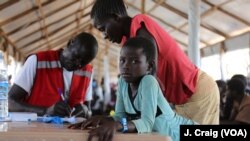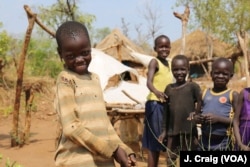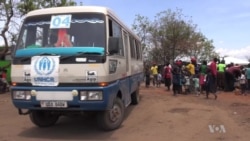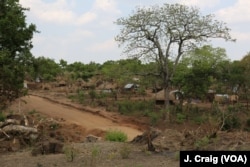No one wants to choose to be a refugee, but many are forced to do just that. They flee violence at home, face restrictions in their new country, and are usually dependent upon others for food, water and health care.
Uganda, a country hosting more than 1.1 million refugees and asylum seekers, is trying to ease their burdens with what many analysts call its "progressive" refugee policy.
Senior refugee settlement officer in the Ugandan prime minister's office, Solomon Osakan, works with the U.N. humanitarian agency to coordinate refugee operations. He says his country's approach comes from a Pan-African mindset of helping Africans in trouble, which currently includes those in neighboring South Sudan, the Democratic Republic of Congo, and Burundi.
"So, I think this policy emanates from our leaders," Osakan said. "Previously, many of our leaders were displaced as refugees, they sought asylum in neighboring countries, and went as far as Europe. In that time, this changed their perception in thinking that when you are a refugee, you need to be supported to survive; otherwise, hostility only worsens."
Uganda has refugee "settlements," not camps. Host communities have donated much of the land for these settlements. Refugees receive a 50-by-50-meter plot for shelter and cultivation, enjoy freedom of movement, receive employment waivers in order to work and can start businesses.
Watch: Uganda Welcomes Refugees with 'Progressive' Policies
"It is good, because here, in Uganda here, we are feeling good," said Joyce Alua, 19, who says she fled gun violence in South Sudan in July 2016 while she was pregnant. "There is no fighting like South Sudan. And other things, also, they are good."
Critics: 'Outsiders' take jobs
But not everyone is pleased. In Imvepi, Uganda's newest settlement that opened in February, some local people are upset that so-called "outsiders" are getting the jobs, not them.
"But the bad thing here is we are lacking of jobs," said Charles Acema, 35, who says he has lived in the Imvepi area his entire life. "Those who are here, they do not give the jobs for us."
Acema is referring to the United Nations and Ugandan government, who responded that many of the jobs in the settlements require skills not always found in the local communities.
Despite his grievances, Acema says he is happy his country is hosting refugees.
"Us, we know that Uganda is a God-loving country," he said. "That is why they welcome refugees here ... we don't have a problem with the refugees. These are our brothers and sisters. We welcome [them] here."
U.N.: Funds needed
Many refugees complain of food shortages. The United Nations has cited underfunding as the problem. Last year, food rations were cut by 50 percent for refugees who arrived prior to July 2015, except for the particularly vulnerable.
The United Nations says it requires roughly $500 million dollars for its 2017 Uganda operations, but as of mid-March had received about $35 million, seven percent of the total.
Uganda hosts more than 816,000 South Sudanese refugees, more than 219,000 from the DRC, more than 44,000 from Burundi and more than 41,000 from Somalia.








